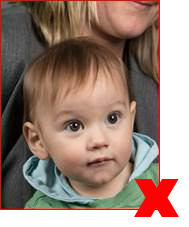The easiest thing to do is to get your passport photo taken by a professional passport photo provider
- Post offices
- Professional photographers
- Large chain stores with printing facilities
- Many camera stores
- Some pharmacies and chemists
- Other established reputable businesses.
We recommend against the use of online passport photo services and mobile apps. You may be in danger of identity fraud.
We’ll attach your photos to the form when you lodge it. Don’t try this yourself, as you might damage them.
Watch this video for advice on getting a good passport photo and a few important dos and don'ts to keep in mind.

| Acceptable | Unacceptable | |
|---|---|---|

Acceptable | 
Side on to camera | 
Hair obscuring face |

Acceptable | 
Insufficient contrast | 
Background not plain |

Acceptable | 
Background too dark | 
Eyes/edges of face obscured |

Acceptable | 
Eyes not open/toy visible | 
Parent visible |

Acceptable | 
No glasses | 
Shadows on image and background |
Photo size and quality
This is what we require:
- Two identical, good quality colour prints, less than six months old, produced using dye sublimation, not from an inkjet printer
- No retouching of any kind (including removal of background, moles, wrinkles or scars)
- Clear, focused image with no marks or 'red eye'
- Plain white or light grey background that contrasts with your face
- Uniform lighting (no shadows or reflections), with appropriate brightness and contrast to show natural skin tone
- Face centred and looking at the camera straight on; not tilted in any direction
- Hair off your face, so that the edges of your face are visible
- Eyes open, mouth closed
- Neutral expression (not smiling, laughing or frowning)
Photos have to be 35mm to 40mm wide and 45mm to 50mm high. The size of the face from chin to crown can be up to a maximum of 36mm, with a minimum of 32mm.
Head coverings
If you usually cover your head for religious reasons, then you can wear the covering in your passport photo.
Religious head coverings have to be plain, without patterns (even small patterns), and be worn in a way that shows your face from the bottom of the chin to the top of the forehead. The edges of your face on either side also have to be visible.
Jewellery and piercings
Jewellery can’t obscure any part of your face, especially the area around your eyes, mouth and nose. There can’t be any reflection from rings or studs.
Glasses
Glasses are not allowed in passport photos.
If you cannot remove your glasses for medical reasons, the frames can’t obscure your eyes and there can’t be any reflection from the lenses. Note: vision impairment alone is not an acceptable reason to wear glasses in a passport photo.
Hearing aids
If you usually wear hearing aids, you can wear them in your passport photo - this applies to adults, children, and infants.
Babies and infants
For infants (under three years of age), a photo with an open mouth is acceptable. The photo has to comply with all the other requirements. No other person or object can be visible in the photo.
Medical exemptions
If you can’t meet these photo guidelines because of a medical condition, you’ll need to show us a medical certificate or fill in a declaration form that explains why.
For more information, see our Brochure - Camera operator guidelines (PDF 358 KB)


